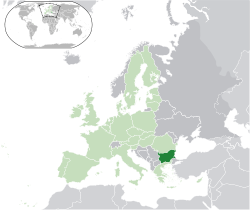Bulgarian Fans Of Pussy Riot Paint Soviet Memorial
Champions of the punk group have redecorated the Soviet Army monument in Sofia as an act of solidarity with the group, whose court verdict Friday sentenced them to two years.
Bulgarian supporters of the female Russian punk group, Pussy Riot, have painted the hoods of the soldiers of the Soviet Army monument in Sofia with signs of support for the band.
The inhabitants of the Bulgarian capital woke up on Friday morning to find colourful hoods painted on the soldiers as a mark of solidarity with the three girls from the group.

Russian prosecutors were seeking three years in jail for the group after they staged a “punk prayer” against the Russian President, Vladimir Putin, in a Moscow cathedral in February. They were escorted outside the building by guards only a minute later.
The artistic protest in Sofia is addressed to the Russian embassy in Sofia, the Bulgarian government, parliament and the media, with the idea of focusing attention on what supporters of the young women see as an unfair trial.
The authors demand the immediate release of the band by Russia’s “totalitarian regime, terrorizing fellow country people.
“Pussy Riot are an inspirational symbol of the fight for democracy in Russia,” the message on the monument in Sofia reads.
“The entire international community, including Bulgaria’s authorities, must support them in their fight to stop the regime from attempting to shut their mouths.
“With this act of protest we want to demonstrate that Bulgaria is joining the brave members of the group in their quest. We are all Pussy Riot.”
The hoods are the same as those worn by demonstrators in Moscow, protesting in support of the band.
